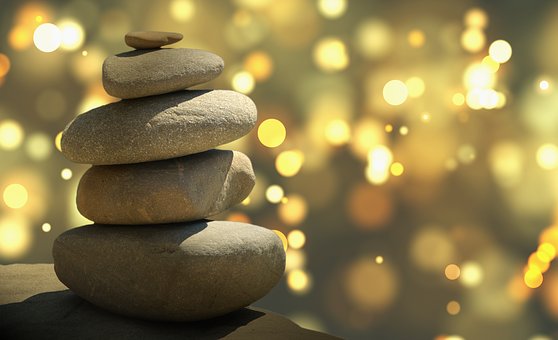When they’re out in the field, soldiers don’t spend a lot of time thinking about the “vibe” of the area where they sleep.
Male or female, they have a cot and maybe a footlocker. Maybe they live out of a rucksack. It’s a simple, spartan existence.
Of greater concern than the vibe projected by where they sleep are the other soldiers in their squad. Do they snore? Do they talk in their sleep? Do they get ready for bed noisily? Can they be trusted?
A lot of people live like this. Someone who works from home and lives in a small apartment tends to have computers and other work-related items all over their living space. There’s only so much room and they’ve got to make every square inch count.
Then there are hoarders. They’ll have items stacked within their house from floor to ceiling. They wend their way through their house through passages that remind one of a maze.
In feng shui, “vibe” = “chi”
In the west, if we even think about it, we call it “the vibe.” In the east, it’s referred to as chi. Feng shui addresses the flow of chi in the home and bedroom. Chi, in this sense, refers to “life force.” Practitioners say paying attention to this can help with improved sleep, happiness, and even wealth.
Some people say when they’re traveling the vibe of where they sleep can be off. It affects their rest.
To reconfigure a bedroom to make it feng shui compliant, people move their beds to allow their head to face a particular direction. People also move dressers and other furniture to promote energy flow.
Books, podcasts, websites, and experts are dedicated to teaching these principles. One can also find testimonials gushing about how redecorating their home according to feng shui principles changed their life.
A feng shui review of studies shows no effect on happiness or sleep
A review of objective studies shows that while people tend to be positive toward the changes feng shui prescribes, it has no effect on happiness or sleep. A 2016 study from Malaysia found people prefer to sleep in an environment designed according to feng shui principles. However, though they like it, the environment itself doesn’t improve sleep. The 405-response study considered Form School Feng Shui.
Does feng shui help mood? Having a better mood would help one sleep better.
Another 108-response study from England looked at mood related to staff in a critical care unit. Beds in the unit were divided into wind, water, and control groups. Nurses and support staff were assigned to the different groups accordingly. The study considered inner harmony and the emotional well-being of the staff members.
In that study, feng shui was found to have no effect on inner harmony and emotional well-being.
Further, a 40-person study from Taiwan in 2006 also found while people prefer feng shui landscapes, it has no effect on their happiness. In the studies above, only one noted the type of feng shui practiced, the one from Malaysia. That’s typical.
In spite of these studies, the Internet is rife with articles purporting that tell you how to use feng shui to improve your sleep.
Feng shui lends a room a nice look; isn’t that enough?
In the west, Black Hat feng shui is the school we’re most exposed to. In further studies on this topic, the different schools could be considered to see if there is a change in response. The takeaway, for now, is that while redesigning your bedroom according to feng shui principles is nice, it’s not going to affect your quality of sleep.
People like to be in a clean environment whether you say it’s for better energy flow or whether it’s more pleasant. Feng shui definitely promotes a clean environment. There’s nothing wrong with enjoying your home and where you sleep.
Despite anecdotal evidence, don’t look to feng shui as a cure for sleeping problems unless your dreams point to a messy bedroom as a source of conflict with yourself.
So straighten up the surfaces of dressers. Vacuum. Clear out the stuff that’s under your bed. Air the whole chamber out.
Cleaning up your environment might help you enjoy your sleeping environment more. There’s nothing wrong with that.
A number of studies suggest that worrying about the direction your head lies doesn’t matter in the least.
Other sleep suggestions based in alternative medicine that been shown to help people get better-quality sleep include the scent of lavender, certain foods, and brainwave entrainment.
For further reading:
Charles R, Glover S, Bauchmüller K, Wood D. Feng Shui And Emotional Response in the Critical Care Environment (FARCE) study. Anaesthesia. 2017;72(12):1528-1531. doi:10.1111/anae.14105.
Hong, W. T., Abdul-Rahman, H., & Wang, C. (2016). The application of Form School Feng Shui model in a sleep environment: human preferences and subjective sleep quality evaluation. Architectural Engineering & Design Management, 12(6), 442–459. https://doi.org/10.1080/17452007.2016.1208076
Ke-Tsung Han. (2006). An Empirical Approach to Feng Shui in Terms of Psychological Well-being. Journal of Therapeutic Horticulture, 17, 8–19. Retrieved from http://0-search.ebscohost.com.mwrlibrary.armybiznet.com/login.aspx?direct=true&db=asn&AN=26766558&site=ehost-live&scope=site&authtype=uid&user=millenium&password=user
Sunshine Adds Muscle to Disinfection
Energy healing: what it is and how to explore it
Cuddling is a type of energy healing
There’s one big trick to making a sleep patch work
5 reasons why cleaning your bedroom is important
James Cobb, RN, MSN, is an emergency department nurse and the founder of the Dream Recovery System. His goal is to provide his readers with simple, actionable ways to improve their health and maximize their quality of life.
This post includes affiliate links for which we receive a small commission if something is purchased through the link.
Updated on May 14, 2021
